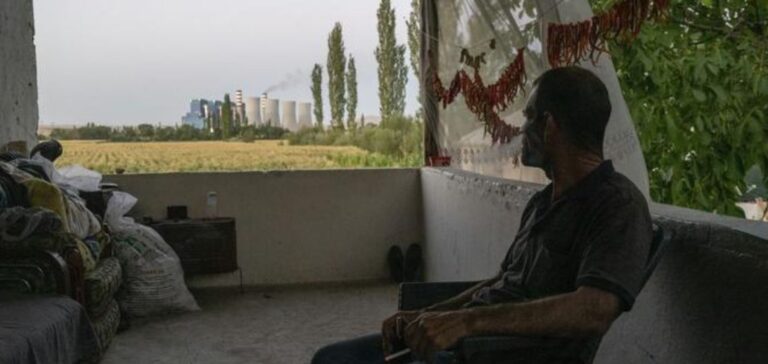Osman Arslan prepares his tea kneeling at the foot of an early-morning tree, while behind him rises a coal-fired power station that looms like a beast over his Turkish village on the Aegean coast.
Soma coal-fired power plant: Between memories of flourishing agriculture and Turkey’s environmental struggle
Having just returned from a pilgrimage to Mecca with his wife, the middle-aged man remembers the golden age of local agriculture, when there was no thermal power plant in Soma (west of the country). Back then, his olive trees were in better shape,” says Osman Arslan, as the smoke from his tea mingles with that from the power plant’s chimneys. In addition to the environmental consequences, the Soma coal mine was also the site of Turkey’s worst industrial disaster.
In 2014, over 300 people died in an accident at the mine, making the industry very unpopular with the local population. However, like other power plants, Soma is seeing its coal resources dwindle drastically and is looking to expand onto new land, much to the dismay of local residents. Environmental activists and villagers clashed with the gendarmerie in southwest Turkey’s Mugla province when a factory began felling trees and olive groves in search of coal last month.
A high human cost: Impact of coal-fired power plants in Turkey on health and the environment
An AFP journalist toured the vicinity of five coal-fired power plants in Turkey, to see that the human cost of this highly polluting energy resource is high. Olives in the Aegean town of Milas, tomatoes and beans on the Afsin plain are no longer flowering to the same extent, while respiratory problems have become the main killer in Yatagan (south-east).
Here, the power plant, one of the oldest in the country, emits a strong smell of methane that permeates the air, and layers visible to the naked eye cover trees and gardens. Okan Goktas, 44, who irrigates his land in the late afternoon, tells us that his brother used to work at the plant, as did “several villagers in the surrounding area”, before retiring.
“Aid (from the government, ed. note) for agriculture is almost non-existent, so the population had no choice but to work at the power station.”
While conservative President Recep Tayyip Erdogan, re-elected in May, has pledged that Turkey will achieve zero carbon emissions by 2053, criticism is mounting. Turkey is the last country in the Group of 20 leading economies in the world to have ratified the Paris Agreements, after the environment became a major issue following the fatal fires in 2021. Anyway, the power plants get the necessary government approvals for their expansions.
Power plants’ insatiable appetite: When farmland gives way to energy expansion in Turkey
The Yenikoy and Kemerkoy power plants have mowed down land where Milas olives, exported worldwide, once grew. According to the villagers, the Yenikoy power plant buys agricultural land at reduced prices, playing on the desperation of local landowners who are convinced they have no other choice. But the Yenikoy power plant still seems insatiable, and continues its quest for agricultural land and forests to meet its needs.
Over the past two years, several bays have been almost completely swallowed up, forcing some villagers to migrate, others to see their lives now dependent on work in these factories. According to Nail, 63, the Karabiga plant on the Aegean coast employs 600 people, including his son.
Yusuf, who watches the mine from his balcony in the town of Afsin, in the southeastern Turkish province of Kahramanmaras, is also a miner. According to him, farmers are struggling to cultivate their land because of the mine’s pollution. The 48-year-old miner is convinced that the mine does not use proper air filters at night, which prompted him and his brother to take legal action. To no avail. The commissioned experts concluded that there had been no infringement.






















